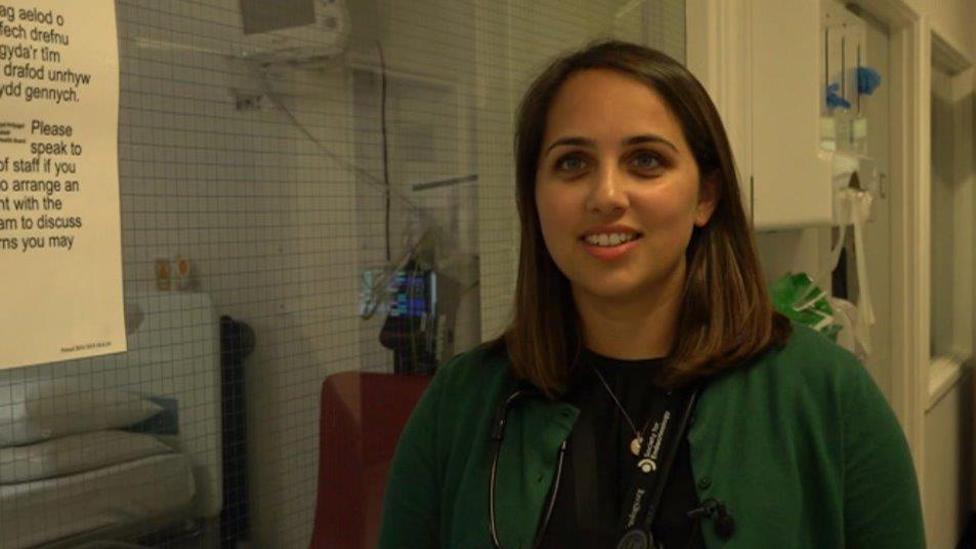NHS Wales' doctor shortage 'risk to children's health'
- Published

The largest shortfall is in general paediatrics, who care for children from birth to late adolescence
Children's health could be at risk if a shortage of specialists is not urgently addressed, a doctors' body has said.
At least 73 consultant paediatricians - an increase of 42% - are needed in Wales to deliver the right level of care, according to the Royal College of Paediatrics and Child health (RCPCH).
It is the latest warning about recruitment problems in the NHS.
The Welsh Government said it was investing record levels in training and education in the health service.
While there was a 2.9% increase in the number of paediatric consultants in Wales between 2015 and 2017, it was below the 6.4% increase in England, the RCPCH said.
It warned children's health services were on the brink of a recruitment crisis.
Dr David Tuthill, a paediatrician and the RCPCH's officer for Wales, said the report highlighted the seriousness of the problem.
"Failing to take the necessary steps now will be to the detriment of our children now and in the future," he added.
The largest shortfall in staff is in general paediatrics, accounting for well over half of the extra recruitment needed.
General paediatricians look after children from birth to late adolescence, and are trained to manage multiple health problems.
There were also concerns about recruitment into rural areas, and community and specialist paediatrics.
The report said Wales had 2.6 consultant paediatricians per 10,000 children, lower than the UK rate of 2.8.
Wales also has an older paediatric workforce than the other UK nations. Nearly half of consultants are aged 50 or over, which "combined with the slow rate of workforce growth this is a serious concern", the report said.

"Failing to take the necessary steps now will be to the detriment of our children," say paediatricians
The RCPCH report recommended that:
Umbrella body Health Education and Improvement Wales must develop a tailored strategy for developing the workforce involved in looking after children, including health visitors, nurses and doctors
The Welsh Government needs to increase the number of paediatric trainee places in Wales
Incentives such as bonuses should be considered to recruit and retain children's doctors, particularly in remote or rural areas
The college also backed calls from the Royal College of General Practitioners for GPs to have an extra year of training, including six months dedicated to child health.
The Welsh Government said its figures for 2015-2018 showed an increase in paediatric consultants of 18.9%.
Its spokesman said: "We are now investing record levels in training and education for NHS Wales and have more training places than ever before."
He added their national and international recruitment campaign had previously included a focus on paediatric trainees.

Analysis by BBC Wales health correspondent Owain Clarke
Children's doctors, hospital doctors and GPs have all this week raised serious concerns about staffing.
There are simply not enough of us, they argue, to cope with the growing demand for care.
But each specialism is making its own distinct case for a bigger share of limited resources.
Children's doctors have argued for some time that overly prioritising the needs of an ageing population risks storing up bigger problems later on if unhealthy children grow to be unhealthy adults.
There has also been concern about the absence of a workforce plan for the entire Welsh NHS - which some have argued has led to too many short-term fixes to plug gaps.
The relatively new umbrella body, Health Education and Improvement Wales, is now working on that very plan to decide on the right mix of staff for the future.
Different groups across the Welsh NHS are already setting out their stalls, and striking the balance will not be easy.
- Published9 May 2019

- Published8 May 2019
